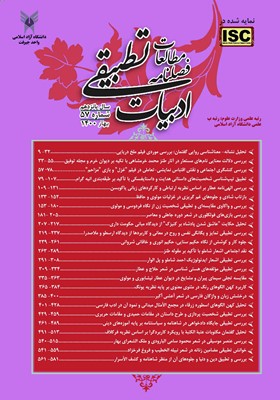درخشش زبان و واژگان فارسی در شعر أعشی أکبر
محورهای موضوعی : شعرنیره نظرریا 1 , محمد جنتی فر 2 , سیداکبر غضنفری 3
1 - دانشجوی دکتری زبان و ادبیات عربی، دانشگاه آزاد اسلامی، واحد قم
2 - عضو هیأت علمی دانشگاه آزاد اسلامی واحد قم
3 - عضو هیأت علمی دانشگاه آزاد اسلامی واحد قم
کلید واژه:
چکیده مقاله :
ایران و پادشاهان فارس چون یکی از تمدنهای باستان و قدیم کره خاکی به حساب میآیند، توانستهاند نظر ملتهای مختلف از جمله أعراب را به خود جلب نمایند و اعشی اکبر که شیفته این تمدن و رفتار فارسها شده بود با رفت و آمد و مدح و وصف پادشاهان و بزرگان ایرانی چون کسری انوشیروان و شاهپور، جای خود را در دستگاه حکومتی و دربار فارسها باز کرد و شعرش سرشار از واژههای فارسی شد که وی از فارسها به عاریت گرفت و نحوه نگارش و انشاء آن الفاظ هم عیناً مانند همانی بود که در میان فارسها متداول بود. این تحقیق که در نوبه خود یکی از مقالات خاص در حوزه ادبیات تطبیقی و آن هم تطبیق در میان دو زبان فارسی و عربی، بر آن است تا با ذکر واژگان فارسی در میان ابیات شعری به جای مانده از اعشی، آنها را بیان و درخشش زبان فارسی را در دیگر زبانها مخصوصاً زبان عربی نشان دهد.
Iran and the kings of Persia, as one of the ancient civilizations of the planet, have been able to attract the attention of various nations, including the Arabs. Aashi Akbar, who was fascinated by this civilization and the behavior of the Persians, by traveling and praising the kings and great Iranians such as Kasra Anoushirvan and Shahpour, opened his place in the government and court of the Persians and his poetry was full of Persian words that he borrowed from the Persians and the way of writing and composing those words was exactly the same as what was common among the Persians. This research, which in turn is one of the special articles in the field of comparative literature and the adaptation between the two languages of Persian and Arabic, aims to express and shine the Persian language in other languages, especially Arabic by mentioning Persian words among the verses of poetry left over from Aashi.
قرآن کریم.
الإصفهانی، أبوالفرج علی بن الحسین. 1974م، الأغانی، الطبعة الأولی، القاهرة: الهیئة العامة المصریة للکتاب.
آذرنوش، آذرتاش. 1374ش، راههای نفوذ فارسی در فرهنگ و زبان عرب جاهلی، چاپ اول، تهران: انتشارات توس.
بروکلمان، کارل. 1968م، تاریخ الأدب العربی، مترجم: عبدالحلیم النجار، الطبعة الثانیة، مصر- قاهرة: دار المعارف.
الجمحی، محمد بن سلّام. 1402ق، طبقات فحول الشعراء، شرحه: محمود محمد شاکر، السفر الأول، الطبعة الأولی، جدّة: دار المدنی.
شیر، أدّی. 1386ش، واژههای فارسی عربی شده، مترجم: حمید طبیبیان، چاپ اول، تهران: انتشارات امیرکبیر.
ضیف، شوقی. 1960م، العصر الجاهلی، الطبعة السابعة، القاهرة: دار المعارک.
محمدحسین، محمد. 1950م، دیوان الأعشی الکبیر میمون بن قیس، الطبعة الأولی، بیروت: انتشارات المکتب الشرقی للنشر و التوزیع.
ملاح، علی. 1376ش، فرهنگ سازها، چاپ اول، تهران: انتشارات کتاب سرا.
_||_
Bibliography
The Holy Quran.
Al-Isfahani, Abu al-Faraj Ali bin Al-Hussein. 1974, Al-Aghani, First Edition, Cairo: Al-Heyat Al-Amat Al-Mesriyat Lelketab.
Azarnoosh, Azartash. 1995, Ways of Persian Influence in Pre-Islamic Arabic Culture and Language, First Edition, Tehran: Toos Publications.
Brockelman, Carl. 1968, History of Arabic Literature, Translator: Abdul Halim Al-Najjar, Second Edition, Egypt - Cairo: Dar Al-Maaref.
Al-Jamhi, Muhammad bin Salam 1402 AH, Classes of Poets, Commentary: Mahmoud Muhammad Shaker, First Journey, First Edition, Jeddah: Dar Al-Madani.
Shir, Adi. 2007, Persianized Arabic words, translated by Hamid Tabibian, first edition, Tehran: Amirkabir Publications.
Zeif, Shoghi, 1960, Al-Asr Al-Jaheli, Al-Tabaa Al-Sabea, Al-Cairo: Dar Al-Maarek.
Mohammad Hossein, Mohammad, 1950, Divan Al-Aashi Al-Kabir Mimun Bin Ghais, Al-Tabaat Al-Avali, Beirut: Publications of Al-Maktab Al-Sharghi Lelnashr and Al-Tozi.
Malah, Ali, 1997, culture creators, First edition, Tehran: Ketabsara Publications.

